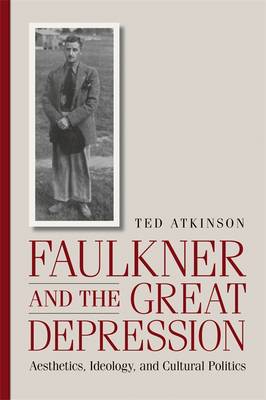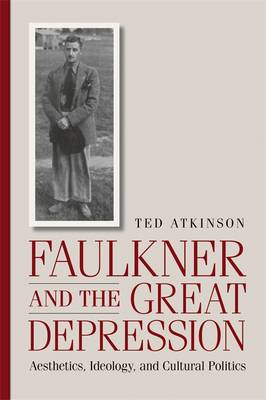
- Retrait gratuit dans votre magasin Club
- 7.000.000 titres dans notre catalogue
- Payer en toute sécurité
- Toujours un magasin près de chez vous
- Retrait gratuit dans votre magasin Club
- 7.000.000 titres dans notre catalogue
- Payer en toute sécurité
- Toujours un magasin près de chez vous
Faulkner and the Great Depression
Aesthetics, Ideology, and Cultural Politics
Ted Atkinson
Livre relié | Anglais
63,45 €
+ 126 points
Description
"Remarkably," writes Ted Atkinson, "during a period roughly corresponding to the Great Depression, Faulkner wrote the novels and stories most often read, taught, and examined by scholars." This is the first comprehensive study to consider his most acclaimed works in the context of those hard times.
Atkinson sees Faulkner's Depression-era novels and stories as an ideological battleground--in much the same way that 1930s America was. With their contrapuntal narratives that present alternative accounts of the same events, these works order multiple perspectives under the design of narrative unity. Thus, Faulkner's ongoing engagement with cultural politics gives aesthetic expression to a fundamental ideological challenge of Depression-era America: how to shape what FDR called a "new order of things" out of such conflicting voices as the radical left, the Popular Front, and the Southern Agrarians. Focusing on aesthetic decadence in Mosquitoes and dispossession in The Sound and the Fury, Atkinson shows how Faulkner anticipated and mediated emergent sociocultural forces of the late 1920s and early 1930s. In Sanctuary; Light in August; Absalom, Absalom!; and "Dry September," Faulkner explores social upheaval (in the form of lynching and mob violence), fascism, and the appeal of strong leadership during troubled times. As I Lay Dying, The Hamlet, "Barn Burning," and "The Tall Men" reveal his "ambivalent agrarianism"--his sympathy for, yet anxiety about, the legions of poor and landless farmers and sharecroppers. In The Unvanquished, Faulkner views Depression concerns through the historical lens of the Civil War, highlighting the forces of destruction and reconstruction common to both events. Faulkner is no proletarian writer, says Atkinson. However, the dearth of overt references to the Depression in his work is not a sign that Faulkner was out of touch with the times or consumed with aesthetics to the point of ignoring social reality. Through his comprehensive social vision and his connections to the rural South, Hollywood, and New York, Faulkner offers readers remarkable new insight into Depression concerns.Spécifications
Parties prenantes
- Auteur(s) :
- Editeur:
Contenu
- Nombre de pages :
- 288
- Langue:
- Anglais
Caractéristiques
- EAN:
- 9780820327501
- Date de parution :
- 03-01-06
- Format:
- Livre relié
- Format numérique:
- Genaaid
- Dimensions :
- 170 mm x 236 mm
- Poids :
- 548 g







